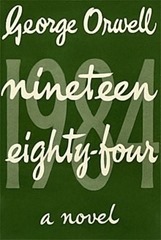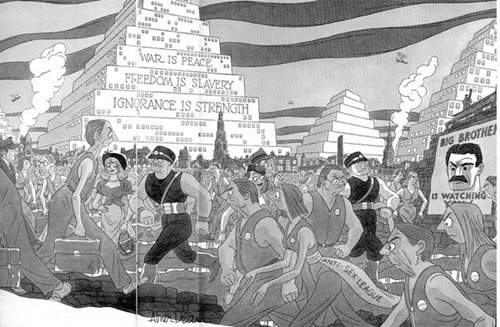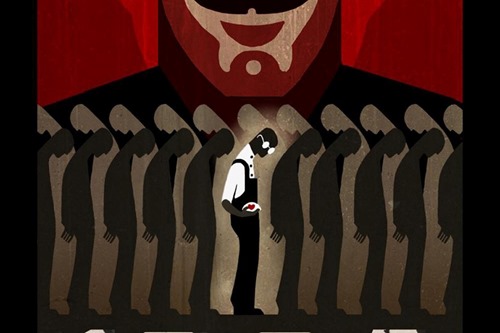First published in the summer of 1949, 1984, is a political novella written by Eric Arthur Blair. He was more famously known by his pen name George Orwell. Orwell was famous for two of his political masterpieces, 1984 and Animal Farm. He was a staunch observer of the ways political powers manipulate their masses into submission and devotion. The idea of 1984 is also centered around this topic. The book has many achievements under its belt, including the Prometheus Hall of Fame Award.
Despite being a dystopian fictional piece of writing, the debate and dialogue that this book prompted are pretty thought-provoking. In fact, 1984 has been banned in the past allegedly for its sadist political nature and sexual content. It’s popularity skyrocketed when the book was made into a film as well. Here are some of the government influences of “1984”.
It Describes the Future of Government Surveillance
Whether you call it a mere coincidence or an elaborate prediction, the plot has vividly described the future form of governments. It was written nearly 70 years ago when there was no concrete way of mass surveillance and control. Despite this, Orwell was able to paint a fairly accurate picture of the way the masses would act like sheep. It’s possible to find an essay on 1984 describing the steps taken by the 1984 government to control people. Every “1984” George Orwell essay proves that the current tactics of surveillance are similar to those described in the book.
Television screens record every discreet action. The Thought Police rounds up all people who dare to think differently. Something as simple as possessing a diary is considered a Thoughtcrime and is a punishable act. If we compare it to the present political control, we have a suffocating degree of similar social control. Privacy breaches on social media, mainstream media manipulating people, and law enforcers constantly follow each development in intellectual thought. The fictional government of 1984 and many state governments today have a striking similarity in their surveillance measures.
A Totalitarian Theme
Despite its utmost efforts to look socialist and fair, the 1984 government is explicitly totalitarian in nature. Big Brother is the true savior of Oceania and expects unconditional loyalty from his subjects, especially those in the Party. The Party members are expected to praise every word of Big Brother and show unwavering solidarity no matter what he says or does. Big Brother can say one thing one day and the complete opposite the next. But everybody in the state believes the government completely and trusts the Inner Party members. The entire Party is essentially a vehicle of mass manipulation and control. The members and employees, including the main character Wilson Smith, are responsible for maintaining absolute control.
The Manipulation of Young Minds
Another deadly weapon that the government uses in the 1984 book is the training of young generations. Similar to girl and boy scouts, they learn military activities and loyalty to Big Brother as a part of their schooling. Training of young minds is a crucial way of exercising surveillance within people’s homes. Since children are close to their parents, they often give away possible suspect names to the Thought Police. This control over the upbringing of the young generation is also useful in maintaining loyalty for the Party.
Suppressing Freedom of Thought
Winston is a member of the Outer Party, and his job is to rewrite history in books, newspapers, radio, TV, etc. On the outside, it seems like he enjoys the regime of the Party. But on the inside, he’s totally disgusted by everything he’s a part of. Winston’s consciousness is still alive, and he doesn’t appreciate the use of Newspeak in favor of the Party’s actions.
When he learns about the missing persons who were accused of creating dissent, he walks deep down the rabbit hole. He realizes that the Brotherhood is, in fact, pretty flawed and gruesome. It controls people who have the courage to question the Party’s credibility. There is no tolerance for any thought that doesn’t obey Big Brother. Such thinkers remember history and have ideas that are dangerous. They’re then taken to the infamous “Room 101”, where unspeakable torture kills consciousness of intellectuals and potential “traitors.”
Reading this, you may want to write a 1984 book essay. Just go through 1984 essay examples to get an idea of the effectiveness of torture in suppressing dissent. Winston and his forbidden love, Julia, were criminals of the biggest crime; Love itself. The Party simply didn’t tolerate any emotion besides loyalty to itself. When Winston and Julia were tortured for their own good, their faith and loyalty to the Party were restored.
Capitalist Tyranny
This book has been set in a post-WWII war-torn London. The city is a gloomy and miserable mess with no true happiness whatsoever. However, since the Brotherhood has absolute control over entire Oceania, there’s only one public opinion that can thrive. The people are only allowed to believe that the government is good for the people. There’s no point in questioning the present state of affairs. Even though there’s little to eat on your table, you can’t say there’s of inflation or scarcity in the country. Surviving on stale bread and butter is always enough to keep you healthy.
The essence here lies in believing that the country has huge resources for everything. There’s plenty to eat and adorn even if it doesn’t look that way. Winston notices that the only way to end the Party would be possible through the proletariat.
“If there’s any hope, it lies in the proles.”
Orwell’s dislike for Capitalist lies is often seen as advocacy of communist rule. However, he’s also criticized the communist rule following the Russian Revolution in his other book, Animal Farm.
Conclusion
It’s hard to deny that the book “1984” doesn’t resonate with reality. A capitalist oligarchy with no freedom of intellect whatsoever is pretty common in our world. The book continues to inspire generations to play an effective role in politics for the sake of their true freedom.



